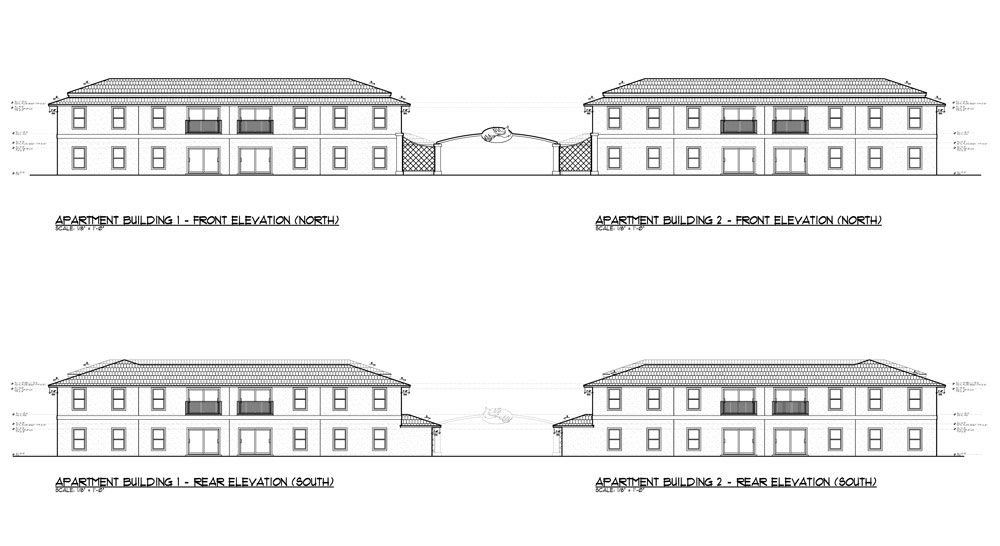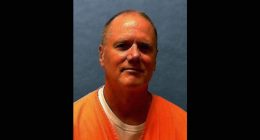
Two weeks after the Bunnell planning board rejected the site plan for Phoenix Crossings, the 28-unit apartment complex for low-income tenants, the attorney representing the development filed an appeal to the City Commission.
The appeal, filed by Dennis Bayer, the Flagler Beach attorney who specializes in land use and environmental law, argues that “there is a lack of competent substantial evidence to support the denial based upon concerns raised by third parties about the stormwater related to this project.” Put another way: the board’s decision was arbitrary and capricious.
The three board members in the 3-2 majority against the site plan claimed the document did not show how the retention ponds on the 8-acre site will be adequate enough to keep water from flowing onto adjacent properties. The site, east of North Bay Street and a few blocks south of Deen Road, is just east of the city’s sewer plant and adjacent, to the north, to a mobile home park inhabited mostly by elderly residents.
Numerous people turned up at the board’s April 1 hearing. All who spoke opposed the development, but not just because of fears of flooding. They spoke about their fear of crime on the not-altogether rational assumption that because many of the tenants in the proposed development will have lived in group homes previously, they would be trouble as neighbors–in an area that happens to neighbor the Flagler County jail, from where inmates are daily released.
Phoenix Crossings is the work of Sandra Shank and Abundant Life Ministries, which runs a group home for adolescents in the foster-care system in Palm Coast. “We have worked many, many years on this project,” she said, “because it’s a mission. It’s a vision. It’s not just housing. It’s permanent, supportive housing for people in our community who need us the most.” (Shank also chairs the Palm Coast Planning Board and sits on the countywide Affordable Housing Committee.)
When individuals age out of the foster care system at 18, they have nowhere to go, Shank said. Phoenix Crossings is intended to fill that gap. It won;t be limited to that group. Shank describes the initiative as “permanent supportive housing” for low-income families, seniors older than 55, and persons with disabling conditions.
Rent will be limited to 30 percent of income. Most of those expected to live there will be on fixed incomes. Phoenix Crossings’s two buildings of 14 apartments each, split between two- and three-bedroom apartments, will be complemented by a fitness center, a library, a park, a chapel and other amenities. Shank says a case manager will be working at the site, as will Shank herself.
It would be the only affordable housing complex of its kind in a county short of affordable housing options of any kind.
Shank says tenants will be local. An expert familiar with the foster-care system is skeptical, saying there would never be enough local individuals aging out of group homes to fill the apartment complex, requiring Shank to recruit from elsewhere–just as local group homes already do–unless the cohort of former foster care individuals is small, relative to other tenants. But that’s a separate issue from the one Shank faces with the city.
Phoenix Crossings has never needed to go before the Bunnell City Commission during its regulatory journey, which began over five years ago. The planning board in 2020 approved the project, with a special exception that enumerated conditions. The board again approved those special exceptions on April 1, just before it denied the major site plan, overriding the city administration’s recommendation to approve it.
The denial does not kill the project. Shank may still submit a different site plan. But it delays it and adds costs, and Shank’s finances are not limitless. She secured $6.25 million from the Florida Housing Finance Corporation. But that award came with its own conditions: Shank had to meet a deadline to secure contractors and get the project going. She’s had to seek two extensions, the last one in October, because she could not find contractors within her budget, and because issues arose at the site–including wetland issues tangentially referred to by the planning board and neighbors. She secured a $750,000 loan to pay for “overages” along the way.
The obstacle to the site plan will likely add costs, unless Bayer successfully argues to the City Commission to reverse the Planning Board’s decision.
Phoenix Crossings, he argued in his appeal letter, “has submitted plans to the St. Johns River Water Management District for the stormwater system which have been approved, subject to finalizing the wetlands mitigation. Typical stormwater plans are designed and permitted by the District to handle the rain and water from a 25 year storm event. The stormwater plans for this project are designed to handle a 100-year storm event, clearly above the standard requirements.”
Bayer noted that the project was recommended for approval by city staff, though that’s really neither here nor there: while local government planners typically make recommendations, they do so within the parameters of their profession, divorced from the politics, social climate and prejudices that surround some projects. The decision belongs to advisory and elected boards, otherwise they’d be superfluous. But developers will often point to staff’s recommendations as objective supporting evidence for their projects.
But Bayer is also on strong ground when he invokes the procedural requirements of a planning board or city commission vote on a site plan: “In order to override the staff recommendation, the opposition must provide competent, substantial evidence in the form of expert testimony. That was not done in this case.” In other words, the opposition cannot prevail merely on a sense that the project could cause flooding, or because people don’t like it. Doing so exposes the city to a lawsuit. Bayer’s letter is not without hints to that effect.
“At the appeal hearing, the applicant will provide testimony from its engineer about the design
and capacity of the storm water system,” he wrote in a letter addressed to Adrian Calderin, Bunnell’s community development coordinator. “In addition, we have had discussions with staff, including the city engineer. Based upon those discussions, the applicant has agreed to additional upgrades in the state-approved system to further reduce any impacts on neighboring properties. This should be sufficient to warrant approval of this project.”
The City Commission is expected to hear the appeal on May 12. If the appeal is successful, Phoenix Crossings’ next step would be to apply for a building permit, if Shank has secured contractors.










